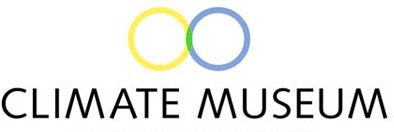Miranda Massie, founder of the Climate Museum, consults with a master’s class in Climate & Society at Columbia University. Source: Grist.org. Photo: Zina Precht-Rodriguez.
A New Museum in NYC: Climate Change Museum, Centre for the Future of the Museum Blog, 22 September 2015
While I spend most of my time scanning for change taking place in society writ large, rather than trends in museum practice per se, I do keep an eye open for new museums. Why and how do museums arise (especially in these financially troubled times)? What are the motivations of the founders, and funders, of these institutions? How do they see “museumness” as a way to advance their goals? … Today’s interview is with Miranda Massie, founder of the Climate Museum being created in New York City. You can follow them on Twitter @ClimateChange.
 Give me the “elevator speech” for the Climate Museum—what do you tell people when you want to explain really quickly, what it will be and why they should care?
Give me the “elevator speech” for the Climate Museum—what do you tell people when you want to explain really quickly, what it will be and why they should care?
The Climate Museum will be a hub for climate science, art, and dialogue in tourist-accessible New York City. Its aim is to put climate at the center of our shared public life, catalyzing broad climate engagement.
Why a museum? People are tackling climate change education in a lot of different ways. What do you see as the advantages of pursuing advocacy and awareness in this traditional bricks-and-mortar format?
There is an outstanding array of efforts already in progress. To name just few examples, 350.org, NRDC, and the George Mason and Yale Climate Communications Centers are doing essential advocacy work that has transformed the conversation. There are robust networks devoted to formal and informal climate education that are similarly critical. We’ve recently started talking with Frank Niepold of NOAA about connecting with these networks and are thrilled about that.
However, to support the growth of a broader climate public, we need a venue—a place where people can be together, learn together and from each other, share experience. When things really matter, we come together in person. Climate really matters and we should have a collective space to do the work of educating people on this topic.
As a side note, my sense is that the social dynamics of face-to-face interactions are why museums continue to be so popular and culturally powerful even as they transform.
Finally, a solutions-showcasing Climate Museum is exceptionally well-suited to break down the barriers we’ve seen to the creation of a climate-engaged public. Research shows us that most people in this country view climate change as an issue, but few prioritize finding solutions for this challenge. Museums help to simplify complexity, and having a museum devoted to this topic could help to make climate science and data palpable, clear, and personal. We want to inspire people to focus on climate success stories large and small, so that visitors leave knowing that what they think, feel, say, and do on climate matters.
We’ll have the benefit of all that on top of the traditional museum virtues of conferring legitimacy and serving as a trusted source of information.
Your organization’s profile on Idealist.org states “The Climate Museum will join a successful group of forward looking, problem solving, citizen museums.” What are some of these “citizen museums” you see as your peers? Is there anything particular about these benchmark organizations you plan to emulate?
We’re not yet the peer of any of the institutions I’m going to mention, but we aspire to be. Some of the great museums that seem to us to aim to build civic engagement include the Holocaust Museum, the Newseum, the 9/11 Museum, the Center for Civil and Human Rights. And the Science Museum of Minnesota, with, for example, its exhibit on race and its upcoming exhibit on cities, seems to us to clearly propose something outside of any simple repository-of-knowledge model.
Even established museums find it challenging to sustain their operations in the new economy. What are you finding are the greatest challenges in starting a new museum?
We’re at such a different stage in our life cycle. That said, I suppose both zygotes and adult organisms need similar things to thrive: favorable contexts, good nutrients, symbiotic relationships.
Our biggest challenge, given that we’re in such a growth stage, is responding to the opportunities rapidly expanding around us in an effective way without irretrievably exhausting our currently minimal staff. A given day can include meetings with exhibit design teams as we familiarize ourselves with that milieu, fine-tuning the formatting of a newsletter, soaking up a mentoring call with one of our incredible advisors, selecting insurance carriers, herding cats to schedule a Trustees’ meeting, taking out the recycling, and deciding between two very similar Pantone yellows. The good news is that we’re meeting with such good will, feel so committed to the mission, and are encountering these challenges so freshly, that they are, in the main, highly enjoyable.
We’re going to be launching seed fundraising in the fall. I’m sure there will be challenges as well as great excitement associated with that.
As a member of your own board observed, climate change can be “a very depressing subject.” Is one of your goals to attract an audience that includes people who are not already passionate about this cause, and if so, how will you go about that?
That’s our single central goal. We have to be clear about urgency while emphasizing success stories and solutions—that will be our great content challenge—and we have to make the experience inspiring, beautiful, connected, impressive, and cool. I am deeply confident that with the right team this can be accomplished.

